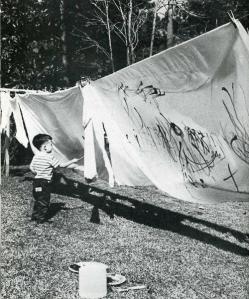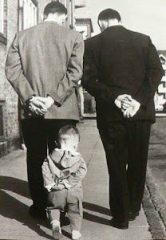 Edith Cobb is one of the few grand old ladies in educational thought and worth reading even today. Actually, one might say, that only today the general public starts to understand the true depth and value of her ideas in the first place. “The Ecology of Imagination in Childhood” is Edith Cobb´s lifework. She collected materials before publishing anything for very many years. The book came out only in 1977, the same year when she died.
Edith Cobb is one of the few grand old ladies in educational thought and worth reading even today. Actually, one might say, that only today the general public starts to understand the true depth and value of her ideas in the first place. “The Ecology of Imagination in Childhood” is Edith Cobb´s lifework. She collected materials before publishing anything for very many years. The book came out only in 1977, the same year when she died.
I have found traces of her ideas in Margaret Mead´s work. Mead was a close co-worker and even wrote an introduction to the book. Cobb´s thoughts about children and their connection to nature are amongst others praised by a popular contemporary journalist and thinker George Monbiot , if just to mention few she has influenced.
Edith Cobb was not a typical educational thinker, she did not follow one school or tradition, instead she mixed ideas and research results from various fields of studies. This was probably the reason why writing a book was such a long venture. To combine and integrate the impossible, to read and learn in multitude of areas parallel, is not an easy task, but can be a rewarding one.
During the years she has developed an original independent vocabulary. Already for that reason only, one might want to read the book now, 40 years later.
Cobb starts by describing the anatomy of wonder.
“…rhythm, like motion, is a cosmic experience, in fact, and the child´s “world making” is a continued cosmic speculation in the form of a recreation and rearrangement of parts of the environment into the synoptic wholes in which the self exists.” (p.43)
Her work is based on numerous autobiographies and play observations. At her time her research methods were way out of the common approach. It was at the height of the positivistic era of experimenting, testing and interrogating. While discussing her methods in the first chapter of the book, she does not mention much about the background of her study. Instead she writes:
“… individual men and women ultimately create cultural and social history in terms of their particular world imagery and their capacity to lead others to participate in the world as they see it, politically, aesthetically, philosophically, or otherwise.” (p.18)
Here you can find her way of approaching the research and introducing it to others. Even though it says little of the actual method of her study, it states clearly the underlying values. I have been missing that kind of declaration in the work of most authors in the field of education.
 What is world image? She mentions it in several occasions.
What is world image? She mentions it in several occasions.
“The concept that the individual´s creation of a world image is the central drive towards human learning (as adaptation to the environment) brings out the ecological pattern of give and take, not only between inner and outer world, but also between past and present as the “autobiographical” search for futurity.” (p.69)
According to Cobb, is nature part of our primary needs, like breathing and eating. Children need nature in order to be creative, to be able to imagine and learn.
“Even in the simplest day-to-day activities, the experience of being oneself, a “circular causal system” in one´s ecology, with the capacity to add forms or to change the very shape and nature of the environment, is in itself a far more creative process, with a much more profound meaning for human beings, than is generally conceded.” (p.69)
She emphasizes terms like “map” and “mapping” because these two words “express an immediacy of experience of organism and environment that has been extended, extrapolated, and transformed into speech as well as into systems of behavior…” (p.46-47). Nature and places in nature have deep meaning to our growing up and becoming an adult. The childhood experiences of explorations and mapping “permits condensation into symbolic pattern or form” as a child and in later life (p.47).
“[B]ecause of our complex eyes, vision has undoubtedly been the ruling experience in the development of human culture and language.” (p.47) Based on that idea she proposes “Intuition, therefore, can be considered to be a type of “seeing,” stimulating in turn the organizing process we call imagination.” (p.47)
As she had followed children in their play for years, she also proposed her original view on play.
“Play can be observed to be a sort of “fingering over” of environment in sensory terms, a questioning of the power of materials as a preliminary to the creation of highest organisation of meaning.” (p.48)
She invites us to think about evolution theory as well as psychoanalysis in her terms throughout the book. Sometimes it is hard to follow the connections she is trying to establish between different theories and ideas. One might consider this being the main difficulty with her style of writing. At the same time it is obvious that the kind of wondering in the world image of hers brings to us novel ideas never really thought let alone discussed before.
I finish this overview with a thought from Edith Cobb directed towards the future of our society, the vision about tomorrow.
“Child fills in the distance between the self and the objects of desire with imagined forms. This psychological distance between self and universe and between self and progenitors is the locus in which the ecology of imagination in childhood has its origin.” (p.56)
It is important to maintain our unique individuality created in contacts with natural environments and not too lose ourselves in the specialized technocratic world of today. Mankind needs the creative imagination of our children more than ever.

